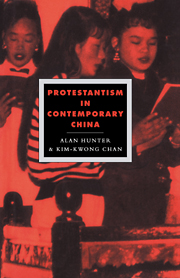Book contents
- Frontmatter
- Contents
- List of figure and tables
- General editors's preface
- Acknowledgements and notes on the text
- List of abbreviations
- Map
- Introduction
- 1 The social and political context
- 2 A survey of the Protestant community
- 3 The historical legacy
- 4 Protestantism and Chinese religious culture
- 5 Varieties of Christian life
- 6 Buddhism and Catholicism
- 7 Into the 1990s
- Bibliography
- Index
7 - Into the 1990s
Published online by Cambridge University Press: 04 May 2010
- Frontmatter
- Contents
- List of figure and tables
- General editors's preface
- Acknowledgements and notes on the text
- List of abbreviations
- Map
- Introduction
- 1 The social and political context
- 2 A survey of the Protestant community
- 3 The historical legacy
- 4 Protestantism and Chinese religious culture
- 5 Varieties of Christian life
- 6 Buddhism and Catholicism
- 7 Into the 1990s
- Bibliography
- Index
Summary
THE CHURCH IN 1992
We have seen that the state of religion in China is much influenced by political considerations among the top leadership of the CCP. The liberal regime of the 1980s allowed a period of rapid growth for the Protestant church, and revival of other religious activities. Then in 1989 a hard-line tendency gained control of the Party apparatus after the suppression of the democracy movement. The new leadership maintained that stability was the most urgent national priority, and imposed more repressive policies in the cultural field, coupled with a slowdown of economic reform, sharp criticism of western interference, and attempts to promote communist ideology. In the first few months of 1992 it was reported that reformists were staging a comeback, apparently under the leadership of Deng Xiaoping himself. Signals appeared in the ‘People's Daily’, where a lead article argued for increased import of western capital, technology and management expertise; it even endorsed the development of a capitalist sector in the economy. The struggle between the two lines was set to intensify in preparation for the Fourteenth Party Congress, scheduled for later in 1992. Deng was allegedly planning to discipline leftists for sabotaging his reform programme, and would then introduce a second wave of market reforms. Senior officials concerned with cultural and educational policy were rumoured to be facing dismissal.
- Type
- Chapter
- Information
- Protestantism in Contemporary China , pp. 257 - 280Publisher: Cambridge University PressPrint publication year: 1993

